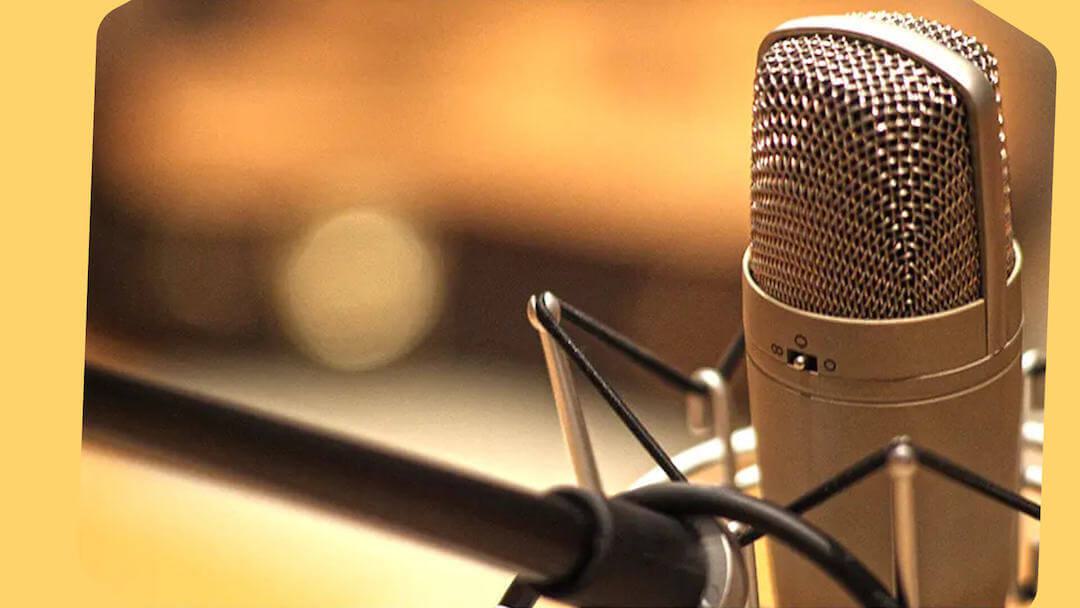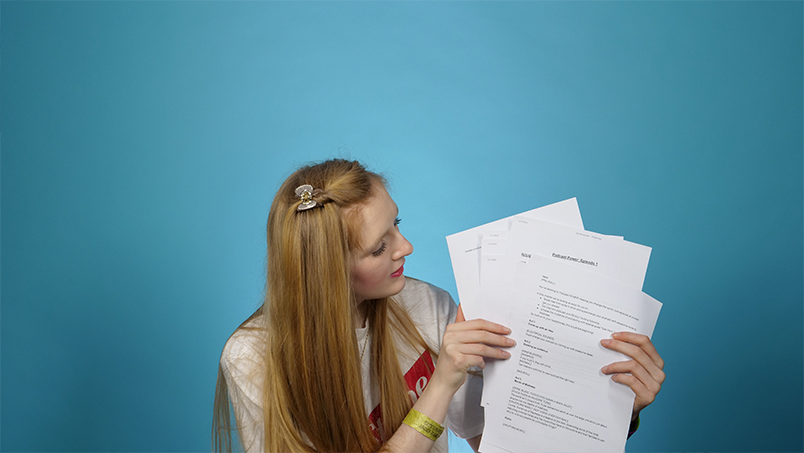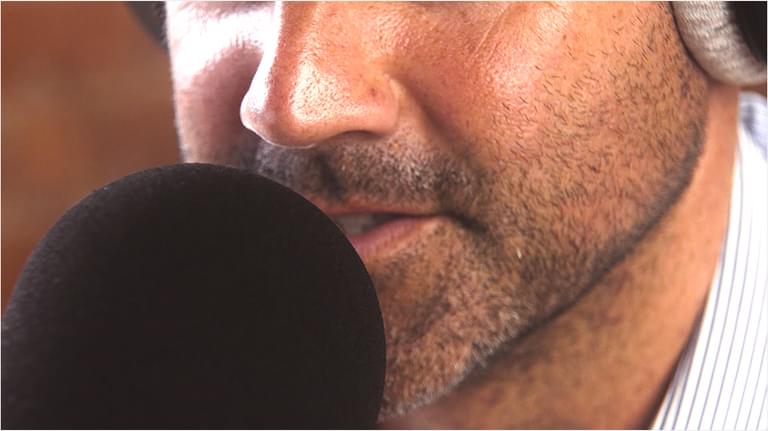Need advice? Let's talk.
Get straightforward guidance from your broadcasting partner. Schedule a call to chat with the team about your radio station.
Book DemoHow to Write a Radio Script That Works
Stop waffling. Write a radio script to produce tighter shows to keep your listeners hooked and engaged for longer.

When broadcasting your radio show, every second counts. Nothing will drive listeners away quicker than lacklustre content. Instead, create a custom-tailored show like a well-made Italian suit. Write a radio script to plan ahead for tighter shows that will keep your listeners hooked and engaged for longer.
Why You Should Write a Radio Script
Scripts aren't essential. But they're a good fallback and structure if you're new or anxious. If you draw a blank on-air, you have something to prompt you. And they can help you keep to the things you want to cover. Writing a radio script can get you in the mindset of thinking of radio links. That is, the segues between different topics and music to keep your show flowing.
How To Write A Radio Script That Works
Before you start writing a radio script, recognise what you're trying to get across and how best to convey it that matches your tone. Be sure you're clear on what type of radio script you're writing. A script for a news update regarding politics or economics is going to sound very different to a short link between two songs.
Radio Script Types
Radio comes in all shapes and sizes, but there are two categories most shows can be placed in; talk radio and music radio. When you write a radio script you need to account for the differences in style and content between these categories; like your choice of song or guest, and choose your words wisely.
Talk Radio Script
Because this type of radio is focused on specific topics and conveys information in interesting ways, it can help to script out what you want to say to avoid needless waffling or, God forbid, you or your presenter running out of things to say. Avoiding dead air is one of the benefits of scripting, after all.
Although there is no industry standard script style, we’ve put together a brief example with notes that may help you with yours. Note how even though there are larger passages of text, they are succinct and easy to read. To access these examples, fill in your details in the red box above and we’ll send them to your chosen email address.
Music Radio Script
A music radio script may have less fully scripted passages and more notes and bullet points to guide the presenter through. This is because music radio is meant to feel more improvised than, say, news or talk radio show.
Despite this, if your music show has a news segment or something that needs a more formal tone, it can still be beneficial to script it out. One of the most important questions you need to ask when preparing your show is whether something needs a full script, bullet points or whether you’ll just allow the presenter to wing it. This decision needs to be informed by everything else you know about the show; what topics you’re covering, who will be presenting, what their personality is like and any other variables your show has.
Again, there is no set script for music radio, but we’ve put together a possible example that could help your shows through the red box above. Note how there are passages of texts for features called read-throughs, which are often used for promotional trails, but the rest of the links are note-based to allow for more informal and flowing conversation.
Guidelines for all Radio Scripts
While Music Radio Scripts and Talk Radio Scripts differ, there are a few universal guidelines you should remember when you write a radio script.
Don't Be Obnoxious or Abrasive
Before you write a radio script, you should know the many pitfalls. Many of the pitfalls with writing scripts also apply to 'on-the-fly' presenting.
You don't want to upset your audience, drive them away, and possibly ruin your reputation. So steer clear of things like swearing and nail-biting topics (depending on your audience). An abrasive personality works for Howard Stern, but not for everyone.
New listeners have no loyalty. Earn trust by being respectful and creating engaging content.
Anything that paints you in a negative light should be avoided. No one likes a bully, so be kind and understanding to engage with your listeners. Avoid anything that would turn people away.
- Talking excessively (when it's not a talk show).
- Shouting / being alarmist.
- Blaming or broadcasting misinformation.
New listeners have no loyalty. Earn trust by being respectful and creating engaging content. On the flip side, take Russell Brand and Jonathan Ross' epic fail on BBC Radio 2 back in October 2008.
After a guest (Andrew Sachs) didn't answer, the two left a number of inappropriate voice messages regarding Brand’s relationship with Sachs’ granddaughter. Swearing, sexual references, and multiple attempts to apologise failed and descended into more attempts at humour.
After the British press picked up the, the two were suspended from the BBC. In a follow-up show, Brand attempted to apologise. Instead, focusing on The Daily Mail (the newspaper that reported the story) supporting Germany in the 1930’s prior to WW2, trying to shift the focus rather than taking responsibility for what he said.
Brand later left the BBC altogether. The careers of both presenters didn't fully recover for nearly 2 decades.
A cautionary tale like Brand and Ross highlights how badly presenters can get things wrong. So with that in mind, write a radio script that works for you, structures your content, and keeps listeners engaged.
Write as You Speak
Wooden conversations are difficult to hear. A script should sound natural when reading aloud. Don’t make the mistake of writing too formally, as it results in a stiff-sounding read through.
One of the reasons people tune into radio is for companionship, whether for long drives or doing household chores, so sounding like Hal 9000 isn’t going to fill the void in someone’s day. Sounding natural is simple; use contractions like “don’t” and “can’t” instead of “do not” and “cannot”, as people don’t normally talk like that unless in formal situations. Likewise, depending on your audience, consider including slang terms, although only if appropriate; nothing will switch a listener off faster than cringe-inducing attempts to sound ‘hip’ or ‘trendy’. Try to write as though you’re speaking off-the-cuff and inject some personality into it.

If you’re having trouble writing, try talking through your script. Read it aloud to see if it flows and sounds natural, then edit appropriately.
Keep it Clear and Concise
When you write a radio script, try to keep it as tight as possible. Avoid unnecessarily flowery words or sentences that don’t add to what you’re trying to say. Make sure your grammar is correct and be as concise and clear as possible, it will allow you or your presenter to improvise and expand on what is written in the script. Radio is at its best when it doesn’t sound rigid, whether fully scripted or not.
It’s worth being aware that when we refer to terms such as ‘concise’, these are not to be misinterpreted as meaning ‘as short as possible for the sake of it’. What they mean is to convey information as clearly and briefly as possible, which is relative to the topics you’re covering. So don’t skip over things just to make them short if there’s more to discuss.
Tell Your Story Right, Set the Scene
Whether you’re breaking a news story or telling a joke on your comedy music show, you have to remember that your listeners don’t have the visual aid of a television or online video.
Try to paint a picture in the listener's mind to help them understand what you’re talking about. This doesn’t mean you need to go into excruciating detail, just give them enough to work with. Tools like world building software also help set a structure and speed up the process.
Write for Other Presenters
Running your own station, you may find yourself writing scripts for other presenters. Write material they will work best with. Depending on their personality, you need to ask yourself if they need full scripting, bullet points, etc.

Tailor your writing style to their natural speech patterns and how they phrase things to make sure that it comes across as authentic to how your audience recognises the presenter. It’s worth giving them input into the script too; they’re likely to point out anything they wouldn’t say normally and could have some good ideas to add.
Need Script Help? Let's Talk
Practice what you preach. Use your radio script to record or broadcast shows. But if you're struggling then we can help.
With a team of radio and audio professionals, Radio.co is the 'go-to' place for broadcasters. So if you've not started your station and would like a tour, plus advice on scripting shows, then book a one-to-one demo.



